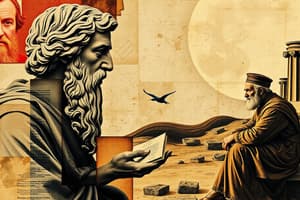Podcast
Questions and Answers
What did Socrates believe about the relationship between the soul and the body?
What did Socrates believe about the relationship between the soul and the body?
- The body lasts longer than the soul.
- Both the body and the soul are equally important.
- The body is more important than the soul.
- The soul is immortal and the body is mortal. (correct)
According to Socrates, what is the significance of self-examination?
According to Socrates, what is the significance of self-examination?
- It reveals the superiority of the physical body.
- It is pointless for human existence.
- It provides the knowledge necessary for a fulfilling life. (correct)
- It leads to societal approval.
What is Plato's view on the soul's existence?
What is Plato's view on the soul's existence?
- The soul develops only during one's lifetime.
- The soul exists before birth and continues after death. (correct)
- The soul is irrelevant to human life.
- The soul and body cannot exist separately.
What does Plato believe is essential for achieving genuine happiness?
What does Plato believe is essential for achieving genuine happiness?
What does Socrates suggest is the most important task for individuals?
What does Socrates suggest is the most important task for individuals?
According to Aristotle, how do essence and matter relate to each other?
According to Aristotle, how do essence and matter relate to each other?
What does Plato suggest one should prioritize in life?
What does Plato suggest one should prioritize in life?
How does John Locke describe the human mind at birth?
How does John Locke describe the human mind at birth?
What is Socrates' perspective on ignorance?
What is Socrates' perspective on ignorance?
Which philosopher is known as the 'father of Western philosophy'?
Which philosopher is known as the 'father of Western philosophy'?
What part of the soul does Aristotle consider when describing humans?
What part of the soul does Aristotle consider when describing humans?
What statement reflects Plato's view on self-conquest?
What statement reflects Plato's view on self-conquest?
What role does memory play in John Locke's theory of self?
What role does memory play in John Locke's theory of self?
Which of the following best represents Plato's view of the soul?
Which of the following best represents Plato's view of the soul?
In what aspect did Aristotle criticize Plato's theory of the self?
In what aspect did Aristotle criticize Plato's theory of the self?
What element of the soul is identified with basic biological needs?
What element of the soul is identified with basic biological needs?
What is the key element that Locke believes constitutes personal identity?
What is the key element that Locke believes constitutes personal identity?
According to Kant, what ability allows individuals to construct their self-identity?
According to Kant, what ability allows individuals to construct their self-identity?
How does Gilbert Ryle define the self?
How does Gilbert Ryle define the self?
What philosophical principle does Ryle's concept of self suggest?
What philosophical principle does Ryle's concept of self suggest?
What aspect of the self does Kant consider to be an authority on morality?
What aspect of the self does Kant consider to be an authority on morality?
What dualistic concept does Ryle's philosophy of the self oppose?
What dualistic concept does Ryle's philosophy of the self oppose?
Which philosopher argues against the existence of a permanent 'self'?
Which philosopher argues against the existence of a permanent 'self'?
What does the outer self primarily represent according to Kant?
What does the outer self primarily represent according to Kant?
What is the original meaning of the term philosophy in Greek?
What is the original meaning of the term philosophy in Greek?
Which philosophical view considers knowledge derived from sensory experiences?
Which philosophical view considers knowledge derived from sensory experiences?
How does rationalism differ from empiricism in its understanding of the self?
How does rationalism differ from empiricism in its understanding of the self?
What does dualism primarily refer to in modern philosophical discourse?
What does dualism primarily refer to in modern philosophical discourse?
Which philosophers are credited with introducing the framework for understanding the self?
Which philosophers are credited with introducing the framework for understanding the self?
What does philosophy seek to understand about the self?
What does philosophy seek to understand about the self?
What key characteristic defines the self according to philosophical perspectives?
What key characteristic defines the self according to philosophical perspectives?
Which characteristic is NOT associated with the philosophical understanding of the self?
Which characteristic is NOT associated with the philosophical understanding of the self?
Flashcards are hidden until you start studying
Study Notes
Overview of Philosophy
- Philosophy is regarded as the mother of all disciplines due to its foundational role in various fields of study.
- Derived from Greek words: "Philo-" meaning loving, and "Sophia" meaning knowledge or wisdom, the term reflects a pursuit of knowledge for its own sake.
- Philosophy involves rational inquiry into the nature of existence, self, and the world, providing a historical framework for self-understanding.
Understanding the Self
- The self is defined as a unified being linked to consciousness, awareness, and agency.
- Different philosophical schools offer diverse perspectives on the nature of the self, shaping ideas about behavior, attitudes, and identity.
Philosophical Perspectives on the Self
- Empiricism: Views the self through sensory experiences and bodily responses.
- Rationalism: Posits innate knowledge, focusing on ideals and truths independent of sensory experiences.
- Dualism: Often refers to the mind-body distinction, asserting that the mind is separate from the physical body.
Classical Antiquity Philosophers
- Socrates:
- Advocated for self-examination as essential for a meaningful life.
- Proposed a dualistic view with the mortal body and immortal soul; knowledge is innate but forgotten in the material world.
- Plato:
- Identified three parts of the soul: Reason, Physical Appetite, and Will/Spirit.
- Emphasized the need for reason to govern the other aspects to achieve genuine happiness.
- Aristotle:
- Introduced the idea that essence (ideal) and matter (phenomenon) coexist and are interdependent.
- Described humans as "rational animals," stressing both physical and intellectual elements of the self.
Modern Philosophical Views
- John Locke:
- Advocated the concept of a "tabula rasa," proposing that identity stems from consciousness and memory.
- Identity persists through the continuity of consciousness over time.
- Immanuel Kant:
- Countered Hume's skepticism about the self, asserting that reason and free will construct identity.
- Differentiated between the inner self (rational reasoning) and outer self (physical existence).
- Gilbert Ryle:
- Defined the self based on observable behavior, rejecting inner states or metaphysical concepts.
- Suggested that self emerges from patterns of behavior, encapsulating the motto "I act therefore I am."
Conclusion
- The exploration of the self through various philosophical lenses reveals its complexity and significance in understanding human identity and existence.
- The contributions of ancient and modern philosophers lay a profound foundation for ongoing discussions in philosophy regarding self-awareness and morality.
Studying That Suits You
Use AI to generate personalized quizzes and flashcards to suit your learning preferences.




